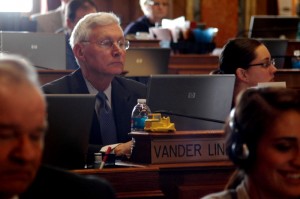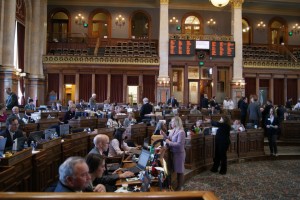Property Taxes Along With Education Still Primary Focus For Local Representatives
Des Moines, Iowa – Betty De Boef (R-What Cheer) serving House District 76 said that this session the big issues will be “trying to find some relief for commercial property taxes”, stating that they pay 100% of assessment, while residential and AG related are nearly half that amount. “Trying to find some way to fix that problem.”
“We are in disagreement with the Senate”, De Boef said, pointing towards the Senate bill that would provide relief of the tax burden more steered towards small business. “They think that’s the solution, it’s not as far as we’re concerned because, like the Governor [Branstad] said in his speech that day he was here.”
In that speech, Governor Branstad outlined how Ying Sa and her fledgling CPA business “feels the brunt of our high property taxes through net-net leases wherein she pays the full cost of the property taxes attributable to her footprint”, Branstad said in the Condition of the State address.
“She and the thousands of hopeful small business owners are the Iowans who most need commercial property tax relief” Branstad stated.
“To say that they’re [Iowa Senate] helping just the small business people and they’re not going to help the big business people”, who can recoup losses or pass them along to small business people like Ying Sa, making it harder in turn for her small business to grow.
“We’re trying to find some way to help all three [business] classes, is basically what were trying to do, but whether we get them [Senate] to accept it is another question”, De Boef said.

Representative Guy Vander Linden works at his desk in the Iowa House on Wednesday afternoon (photo by Ken Allsup)
Guy Vander Linden (R-Oskaloosa) said that there are currently 2 bills in the Iowa House concerning property taxes. “The Governors bill and the House Ways and Means Committee bill. I expect that those will be melded together one way or another through negations between the House and the Governor. The Senate still has their bill from last year, which I understand has not changed. We feel that the House and the Governor, I think, agrees that we have tried to come closer to them in an attempt to come up with a bi-partisan solution. Frankly, I think it’s their turn to move in our direction.”
“We’re hoping that they will come our way a little bit.”
“This is going to get to the floor of the House much earlier than anything got here last year on property tax because we’re going to see to it that we get it fully debated; some action taken if we possibly can. I expect it to come out of committee in the next week or two.”
Education reform is also a topic that has just started to see some serious conversation. “It’s pretty comprehensive. A lot of objections to it we’re hearing”, De Boef stated about the plan as it’s being shaped. “I had superintendents here last week who were complaining about them requiring students to be held back at a 3rd grade level if they can’t read at what they consider to be a 3rd grade level.” She explained that the concerns are that adding an additional year to the students education is costly as well, with superintendents suggesting that the money be invested into remediation to help keep the student moving along with their classes.
“I’ve always felt that just automatically pushing a kid on doesn’t help them any either”, is De Boef’s thought on holding students back.
Another point De Boef pointed out, that could be controversial, is the requirement that teachers maintain a B average in college “to even qualify to become a teacher”.
Branstad, in his Condition of the State address stated, “One, we need a great teacher in every classroom and a great principal leading every building. That starts with being more selective about who can become an educator. A “B” college grade-point average for admission to Iowa’s teacher-preparation programs is not asking too much.”
“To say that unless you maintain a B average your not really a good quality teacher is not an accurate assessment. They believe, and i think there’s a lot of truth to it, that really high achieving students [becoming teachers], a lot of times, can’t really relate to the students; when the one’s that have to struggle more for good grades actually are more creative and better teachers.” was De Boef’s thoughts on the stipulation.
Vander Linden is waiting to see how the bill will emerge from the sub-committee meetings over the education reform presented by Branstad. “I’m sure people are offering their own ideas”, in response to the Governor’s ideas. “We’re making sausage.”
Also, for many school districts, the allowable growth is always an important topic for them every legislative session. “Allowable growth is done; 2%.” Vander Linden said on the subject. Vander Linden pointed towards last years budget when legislators had 0% allowable growth but promised 2% for this year. “Next year, we haven’t gotten that far yet, I don’t think it will be zero. I don’t know what it will be; I don’t think it will be zero again. Could be 2; could be 4.”
Vander Linden said things are just now really getting into gear after nearly a week of speeches such as the Condition of the State, along with the Chief Justice of Iowa, and the Adjutant General all giving their yearly reports to the legislature. Along with speeches was also the task of getting committees organized.
Today Rep. Guy Vander Linden (R-Oskaloosa) supported the first bill of the 2012 Legislative session, House File 2042, a bill that requires that all administrative rules created by state agencies must be accompanied by a ‘Jobs Impact Statement’. Administrative rules are the regulations drawn up by government bureaucrats to implement laws approved by the legislature.
The bill codifies a requirement previously put in place by Governor Branstad via Executive Order 71. It requires that every proposed rule contain a jobs impact statement which sets out in detail the impact of the proposed rule on state agencies, local governments, the public, and Iowa businesses. Additionally, it must determine whether a proposed rule would have a positive or negative impact on private sector jobs and employment.
“I’m pleased to support bills that put Iowans back to work and encourage employers to invest in our state, including this important bill,” said Vander Linden.
The bill passed the House unanimously and is now sent to the Senate for their consideration.

















